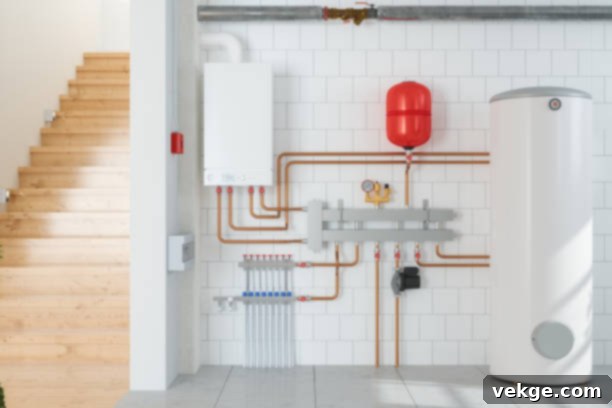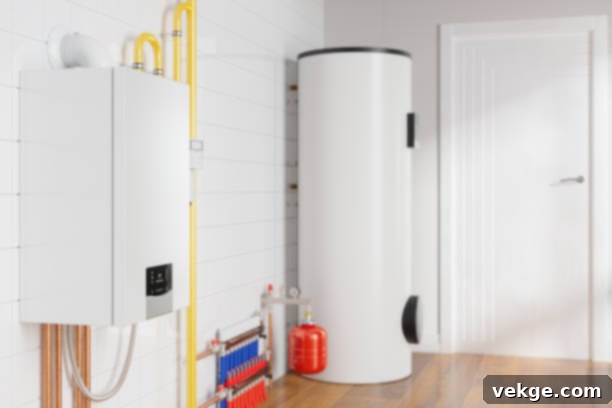Unlock Comfort & Savings: 5 Essential Benefits of Replacing Your Old Water Heater
Often considered the unsung hero of many households, a water heater tank provides a constant stream of hot water for daily needs. Yet, despite its critical role, this vital appliance frequently goes unnoticed until it begins to show signs of distress – a sudden leak, a burst, or an outright failure. Many homeowners tend to overlook their water heaters during routine home maintenance, only to face significant disruption and costly emergencies when the unit eventually gives out.
However, proactively upgrading to a new, highly efficient water heater can bring a multitude of benefits, significantly improving your home’s comfort, habitability, and even your monthly utility bills. Whether you’re aiming for more luxurious baths and showers or simply seeking to reduce energy consumption, a modern water heater is a smart investment. Here are five compelling benefits of replacing your outdated water heater tank with a contemporary model.
Experience Ideal Heater Operation: Quieter Performance for a Peaceful Home
Just like any other essential home appliance, water heater tanks can become increasingly noisy as they age. If you’ve noticed your heater transitioning from a gentle hum or faint tick to disturbing banging, clanging, or even shrieking sounds during operation, it’s a clear indication of internal wear and tear. These noises are often caused by sediment buildup at the bottom of the tank, which expands and contracts with heating cycles, or by failing components within the unit.
Imagine the difference a whisper-quiet performance of a new model can make. With significantly less noise pollution, you can enjoy hushed, indoor conversations without interruption, watch your favorite television shows at a modest volume, and experience deep, restful sleep free from the rumblings of an aging appliance. A new water heater tank, free from heavy sediment accumulations, mineral deposits, and age-related wear, allows you to go about your daily activities without disruption, restoring peace and tranquility to your living space. This enhanced operational quietness is a subtle yet profound improvement to your overall home environment, proving that comfort often lies in the absence of disturbance.
Eliminate Standby Energy Losses: Boosting Efficiency and Saving Money
The market today offers a diverse range of water heater options, from traditional tank-based models to innovative tankless units, as well as electric, natural gas-fired, and hybrid designs. You can even find small, point-of-use appliances designed to serve single rooms or remote areas. For most homes, however, upgrading to a new water heater installation is one of the most effective ways to reduce energy consumption without sacrificing hot water availability.
Older tank-based water heaters are particularly susceptible to what’s known as “standby energy loss.” This occurs because these units continuously heat and reheat the stored water to maintain a set temperature, even when there’s no demand for hot water. This constant reheating cycle leads to significant energy waste. By upgrading to a newer model, even if it’s another storage-based unit, you will immediately experience a substantial reduction in these standby energy losses.
Modern tank-based water heaters feature improved insulation, which dramatically slows heat loss from the stored water. Furthermore, a crucial advancement in contemporary designs eliminates the need for a constantly burning pilot light, a common feature in older gas-fired models that wasted a considerable amount of energy. Products manufactured after 2010 often boast more efficient ignition mechanisms. Instead of a standing pilot, many gas-fired appliances now utilize an electronic ignition switch. These features consume minimal energy only when the heater needs to operate and virtually no energy when the unit is in standby mode, leading to noticeable savings on your monthly utility bills and a reduced carbon footprint.
Leverage the Latest Smart Technologies: Intelligent Hot Water Management
According to the United States Energy Information Agency, heating systems account for approximately 12% of the average household’s monthly utility bill. Fortunately, cutting these costs without compromising comfort is now easier than ever, thanks to advancements in smart home technology. Most new water heater tanks today come equipped with sophisticated, energy-efficient smart capabilities that minimize energy waste and optimize performance. Smart tanks are designed to track, analyze, and even predict your household’s hot water usage patterns, adjusting their operations accordingly to provide hot water precisely when needed.
Beyond basic efficiency, some advanced smart models offer unparalleled convenience. They can turn themselves off automatically when you’re away from home and power back on as you approach, ensuring hot water is ready upon your return. These systems often feature electronic ignition switches, completely eliminating the standby energy losses associated with continuously burning pilot lights when no one is around. This intelligent management not only helps you reduce your energy bills but also contributes significantly to lowering your overall carbon footprint.
The benefits of a smart water heater extend to user control and insight, allowing you to:
- Pre-program the ideal water heating schedule: Align hot water availability with your daily routines.
- Monitor energy consumption: Gain real-time insights into how much energy your water heater is using.
- Turn the unit off and on with ease: Control your water heater remotely via a smartphone app.
- Get performance alerts and maintenance reminders: Stay informed about your unit’s health and upcoming service needs.
It’s important to remember that many of these smart models are learning devices. They gradually adapt to and adjust their settings based on your household’s specific schedules and behaviors, becoming more efficient and intuitive over time. When you install a compatible version, you can often integrate your new water heater seamlessly into your existing smart home ecosystem, enhancing connectivity and centralizing control.
For more insights on extending the life of your water heater tank, you can visit Energy Vanguard.
Increase Your Hot Water Supply: Tailored to Your Household’s Needs

Over time, the demand for hot water in your home can change significantly. This could be due to an increase in household members, such as a new baby, children growing into teenagers who take longer showers, or elderly parents moving in. Even home renovations or additions, like installing a new bathroom or a larger soaking tub, can necessitate a greater hot water supply. If your current water heater consistently leaves you with lukewarm showers or struggles to meet peak demand, it’s a clear sign that its capacity is no longer sufficient.
When considering a replacement, it’s crucial to assess your current and future hot water needs. For homes that consume at least 41 gallons of hot water daily, a tankless heater might be a more suitable and efficient option, as it provides an on-demand, endless supply. For traditional tank systems, a medium-sized 80-gallon water heater is often recommended for households of four people or fewer, providing a comfortable buffer. However, if an adult has recently moved into your house, or if your overall hot water requirements have increased, replacing your current tank with a larger or more efficient model is essential to ensure you consistently have the necessary hot water without waiting or rationing.
Understanding the different types and sizes of water heaters is key to making the right choice for your home’s evolving needs. You can explore various options and learn more about selecting the right model by clicking here.
Limit the Need for Water Heater Repairs: Enjoy Uninterrupted Hot Water and Peace of Mind
Installing a brand-new water heater tank offers more than just energy savings and improved comfort; it also delivers invaluable peace of mind. A new unit is not only highly efficient and cost-effective in terms of reducing energy bills, but it also drastically minimizes the need for frequent and often expensive repairs, which are common headaches with older systems.
Over time, older water heaters are prone to a range of issues. Heavy sediment buildup inside the tank can loosen and cause abrasive damage, leading to cracks in the glass lining or other internal components. Furthermore, the constant pressure and thermal cycles can weaken connections, leading to leaks, ruptures, or pressure-related problems that often necessitate professional maintenance at least once a year. Rust and corrosion are also significant concerns, which can lead to discolored water, reduced efficiency, and eventual tank failure.
By investing in a new system, you can eliminate these worries for years to come. You won’t have to stress about your heater leaking its contents onto your floors, causing extensive water damage, or producing rusty, discolored water that affects your laundry and bathing experience. Most new models come with robust warranties, typically ranging from 10 to 15 years, depending on the manufacturer and model chosen. This means you can look forward to many years of reliable hot water, backed by warranty provisions that cover repairs and replacements for defective parts or improper assembly. This long-term reliability and reduced maintenance burden make a new water heater a truly worthwhile investment in your home’s functionality and your peace of mind.
Conclusion: A Smart Investment for Modern Home Comfort and Efficiency
Replacing your outdated water heater tank is one of the most effective solutions to ensure a consistent and reliable supply of hot water for your household’s evolving needs, especially if your family size has grown or your demand for hot water has increased. The benefits of upgrading to a new model are substantial and far-reaching, transforming your home comfort and delivering significant long-term savings.
From eliminating wasteful standby energy losses and embracing cutting-edge smart technologies that optimize performance and convenience, to ensuring an ample hot water supply perfectly matched to your lifestyle, a new water heater is a fundamental upgrade. Moreover, it drastically reduces the stress and expense associated with frequent repairs and the potential for catastrophic failures common with aging units. By investing in a modern, efficient water heater, you’re not just buying an appliance; you’re securing peace of mind, enhancing your home’s value, and stepping into a future of uninterrupted comfort and lower utility bills.
